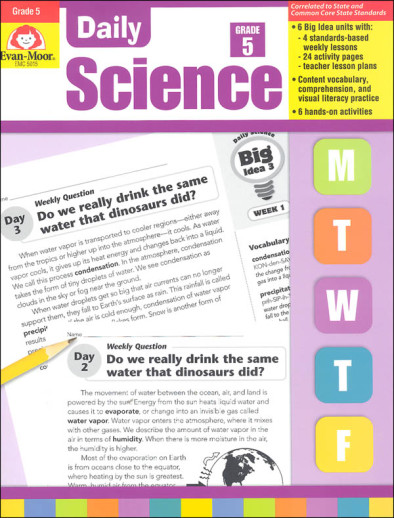We use cookies to make your experience better. To comply with the new e-Privacy directive, we need to ask for your consent to set the cookies. Learn more.
Daily Science Grade 5
The Grade Level Teacher Book provides Teacher pages, Student Activity pages that are reproducible (for one classroom), and an answer key. This course covers: Structure and function in living systems; ecosystems, water cycle; gravity and ocean tides; conduction, convection and radiation; chemical reactions and chemical reactivity.
Fit standards-based science instruction into your curriculum!
Help your grade 5 students develop a genuine understanding of standards-based scientific concepts and vocabulary using the 150 engaging activities in Daily Science! A variety of rich resources, including vocabulary practice, hands-on science activities, and comprehension tests in multiple-choice format, help you successfully introduce students to earth, life, and physical science concepts.
30 weeks of instruction cover the following standards-based science topics:
Big Idea 1: Living things are made mostly of cells. Multicellular organisms have different cells that perform specialized functions
Week 1: Why are bones hard and muscles soft?
Week 2: Why does skin wrinkle in the bathtub?
Week 3: What happens if you swallow gum?
Week 4:How do people give blood without running out of it?
Week 5: Unit Review
Big Idea 2: An ecosystem is a community in which every living thing fills a role
Week 1: Why do earthworms like dirt?
Week 2: Why do pandas eat plants but polar bears eat meat?
Week 3: Is the lion really the king of the jungle?
Week 4: How can so many different plants live in the rainforest?
Week 5: Unit Review
Big Idea 3: Water covers most of the Earth's surface. It circulates between oceans and land in a process called the water cycle
Week 1: Do we really drink the same water that dinosaurs did?
Week 2: Why don't rivers and lakes soak into the ground?
Week 3: What makes the desert so dry?
Week 4: Can we run out of water?
Week 5: Unit Review
Big Idea 4: Gravity is the force that keeps planets in orbit around the sun, and the moon in orbit around Earth
Week 1: Why dowe weigh more on Earth than on the moon?
Week 2: What causes ocean tides?
Week 3: Why are planets round?
Week 4: Why don't planets crash into each other?
Week 5: Unit Review
Big Idea 5: Heat flows from warmer objects to cooler ones until both reach the same temperature
Week 1: How does a thermometer work?
Week 2: How does a microwave oven cook food?
Week 3: What causes hurricanes?
Week 4: How does a thermos work?
Week 5: Unit Review
Big Idea 6: When a new substance is made through a chemical reaction, it has properties that are different from the original substance
Week 1: What puts the fizz in soda?
Week 2: Why does metal rust?
Week 3: Why do batteries die?
Week 4: Why can't you light a match more than once?
Week 5: Unit Review
Providing daily supplemental activity pages for elementary to early middle school, this Evan-Moor series reinforces scientific knowledge, reading comprehension and vocabulary development. Short, 10-15-minute activities organized around reading passages are easy to implement and schedule into your educational day.
Organized into 6 topical Big Ideas Units each investigating a question from life, earth, or physical science and based on state standards. Each Unit is 5 weeks long, with Weeks 1-4 providing teaching on the key information. Weekly lessons begin with a Teacher Page that provides additional information and activity ideas. Student Activity pages follow. Days 1-4 include a variety of writing, comprehension, vocabulary, critical thinking, visual literacy, oral language practice or hands-on activities. Day 5 is review. Week 5 is considered a Unit review with comprehension questions, visual literacy activity, vocabulary review and a hands-on activity related to the previous 4 weeks. From a secular publisher, there is evolutionary content. ~ Deanne
The Grade Level Teacher Book provides Teacher pages, reproducible (for one classroom) Student Activity pages, and an answer key. 192 pgs. pb
The Student Practice Book (Student Workbook) provides only the Student Activity pages. This book is not reproducible and does not include the answer key. It is designed to be used with an additional student or instead of copying the Student pages from the Teacher book.
| Product Format: | Paperback |
|---|---|
| Grade: | 5 |
| Brand: | Evan-Moor |
| ISBN: | 9781596739291 |
| EAN/UPC: | 023472050151 |
| Length in Inches: | 10.875 |
| Width in Inches: | 8.5 |
| Height in Inches: | 0.5 |
| Weight in Pounds: | 1.2 |


I really like how the lessons are short and easy for my kids to complete in a timely manner.
Homeschooling supplement
My daughter loves the way the EvanMoor workbooks are designed. Material is easy to understand, and dare I say...Fun!?
I wanted a quick daily lesson about science. My kids retain quick little lessons better than long drawn out ones.